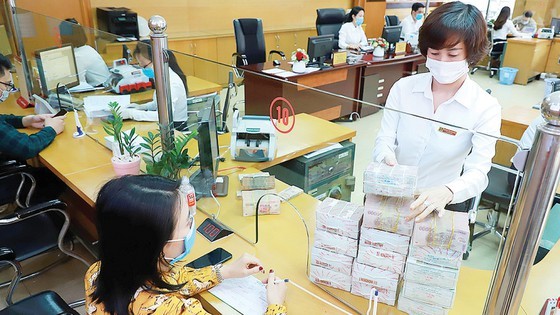Speaking with SGGP Newspaper about the matter, a Member of the National Financial and Monetary Policy Advisory Council, M.A. Can Van Luc, believed the proposal is highly impractical. Mr. Luc said it is unreasonable for VAFI to compare Vietnam’s bank interest with European and other ASEAN countries when drafting the proposal.
“Vietnam’s credit rating and inflation is higher than that of other countries, so it is understandable that we need to issue higher interest rates”, he said.
Mr. Luc also stated how reduced interest rates will have a negative impact on liquidity in that it discourages customers from making deposits, which will result in commercial banks lacking cash.
 A zero-percent interest rate will discourage people from making deposits. (Photo: SGGP)
A zero-percent interest rate will discourage people from making deposits. (Photo: SGGP)
Moreover, people will start looking into risky investments such as stocks, real estate, virtual money, and even rushing to buy gold or foreign currencies if interest rates drop to zero percent, he added.
Meanwhile, the Secretary General of Vietnam Banks Association said that VAFI’s proposal lacks a scientific basis, proving their misunderstanding between central banks’ operating interest rate and commercial banks’ real interest rate.
Some countries in the past have brought rediscount and basic interest rates to zero percent upon negative growth curves, but not deposit interest, he stated.
On the other hand, the Director of ANVI Law Firm disagreed with the use of zero-percent interest rate as an administrative tool to manipulate the market.
“Cash flow always follows the market’s principles and operation. When there are signs of improvements from the stock market, real estate, or construction sectors, investors will automatically know what to invest in. There is no need to force the cash flow elsewhere with a rigid administrative tool”, he concluded.
To gradually lower deposit interest rates to zero percent, VAFI proposed five solutions as follow: imposing a property tax law to limit speculative cash flows into the real estate market, controlling land prices, and applying progressive property tax collection; directing idle cash flow into the bond market with interest rates below two percent a year; collecting foreign currency deposit fees when deposit interest rates decrease; controlling annual budget deficit; and consolidating the banking system by shutting down inefficient banks.
























